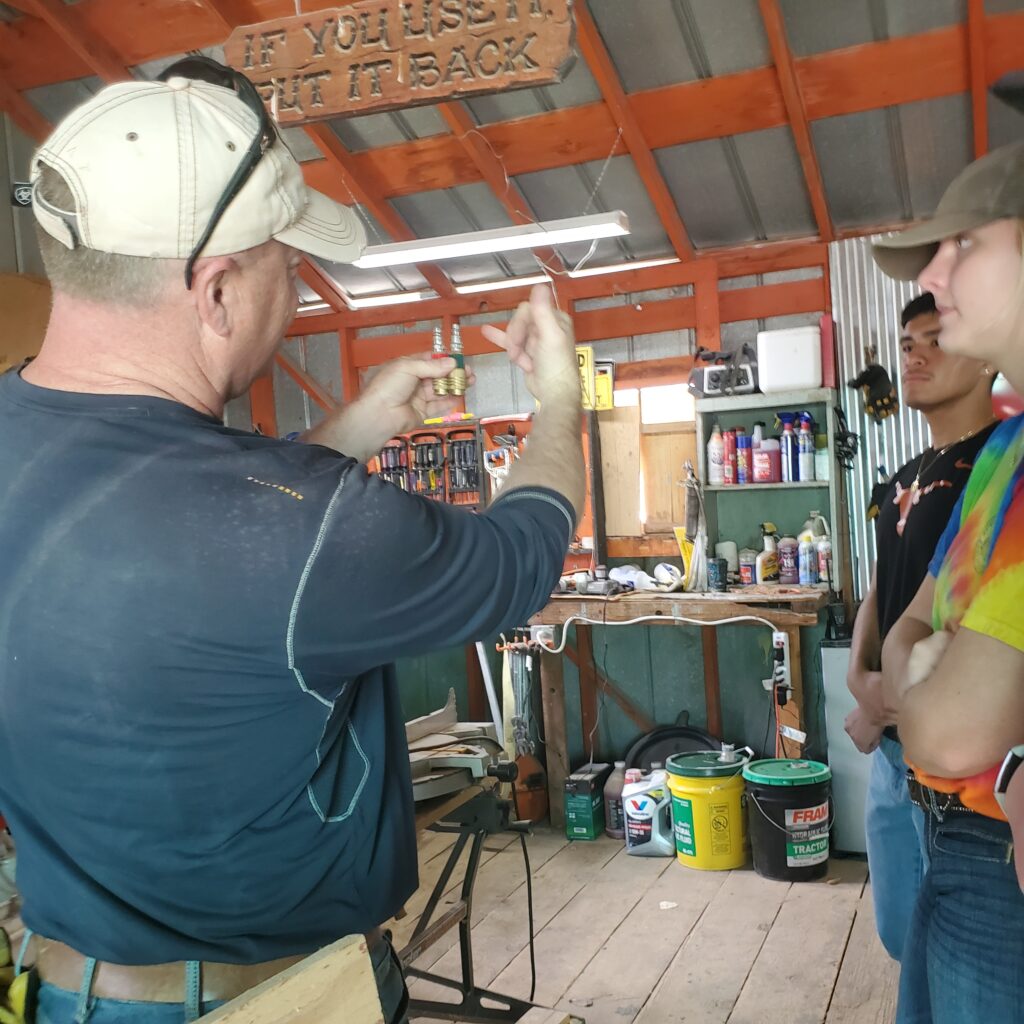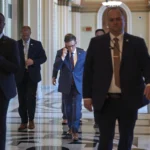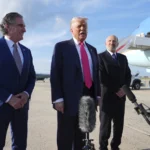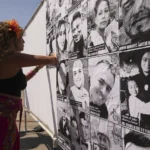THRIVING SMALL BUSINESSES IN WYOMING: Guest Ranch Finds New Mission in Helping Disabled Veterans
California family takes on challenges of regenerative agriculture, paying it forward in Thermopolis
- Published In: Other News & Features
- Last Updated: Jun 26, 2023

Pictured above are Douglas and Eve Lindamood, proprietors of SonRise Ranch, headquartered in Thermopolis, Wyoming. (Courtesy photo from Douglas Lindamood)

By Bob Wooley
Special to the Wyoming Truth
Exciting things are happening in Thermopolis (population 2,706) may be a phrase you don’t often hear. But if you’d been chatting with Douglas Lindamood, founder of SonRise Ranch, you’d know that some pretty interesting things are afoot in Hot Springs County.
“My wife, Eve, and I are just crazy enough to believe we can raise the next generation of regenerative ranchers right here,” he said.
Lindamood, 49, who retired from military service in 2015, has combined the skills he learned both in his youth and as a Marine to create and grow a multi-faceted, tech-savvy cattle business now headquartered in Thermopolis.
Aside from raising cattle on his 1,000-acre ranch, Lindamood sells meat directly to consumers and operates the SonRise Supper Club in nearby Grass Creek that serves a scratch-made menu of steakhouse favorites to people from nearly everywhere.
The restaurant, like most of the couple’s endeavors, started off as a family affair, run mostly by Lindamood, Eve, 45, and two of their adult children and their spouses. But as it’s become more popular, they’ve hired a professional staff of four to run meal services, plus a prep cook who comes in mid-week to make sure they’re prepared for the weekend. The Lindamoods take a hands-on approach to doing the work and perfecting processes in order to write training manuals before passing on the duties to staff members.
It started way out west
Growing up in rural Oregon, Lindamood spent his teenage years working on — and even managing — a cattle ranch, before enlisting in the Marine Corps after high school graduation. As a Marine, he earned a bachelor’s degree in mathematics from Southern Oregon University and a master’s degree in IT management from the Naval Postgraduate School in Monterey, California.

Passing up some enticing job opportunities when he left the military, Lindamood said he felt compelled to use the blessings he’d received in life to do something that could benefit others.
Back in 2005 when Lindamood was in his early 30s, he and Eve founded SonRise Ranch, covering approximately 5,000 acres, in Carmel Valley, California. Eve, Lindamood makes clear, is a true partner involved in every aspect of the business. Using regenerative agriculture methods as a guidepost, they set out to create a cattle operation that could offer 100% grass-fed, antibiotic-free, humanely raised and processed beef, pork and poultry direct to consumers. For the first 10 years, the business was a part-time pursuit that allowed them to learn and experiment while Lindamood worked toward his military retirement.
A strong desire to help customers know where their food comes from was one of the initial drivers of the SonRise mission. Lindamood said he felt lucky to have come from a family with close connections to the land and laments the fact that so many Americans have lost agrarian ties that were commonplace just a few generations ago.
It’s Lindamood’s opinion that, in the interest of health, Americans are becoming more curious about where their food comes from.
“There’s a lot of people that say [the food] is a contributing factor,” he said. “So, people are starting to become more interested in where their food is coming from. And the next thing that happens is that they become what we call ‘farm curious,’ and they want to come out to a farm or ranch and try to find some answers.”
Lindamood said a lot of his business practices are a way of helping folks find them.
With help from family and a bit of trial and error, they grew the company vertically, creating several divisions to allow for diverse income streams across multiple segments of the cattle industry. And just as importantly, keeping it all within direct reach of their customers.
Then COVID came along.
“We vacationed in Wyoming during the pandemic, spent some time in Thermopolis and fell in love with it,” Lindamood said.

Lindamood said his family’s Libertarian leanings urged them to escape what he calls “the heavy hand of bureaucracy” they faced in Carmel Valley. They put down roots in 2021 and made Hot Springs County the headquarters of their ranching operations. Wyoming was an attractive location because the litigious environment in California was too great to open a guest ranch, Lindamood said.
After finding and purchasing a ranch property in Thermopolis, the couple had nearly everything they needed to launch the agri-tourism hub they were planning — but for one critical component.
“The tourists coming through the area — primarily on their way to Yellowstone — weren’t as interested in agri-tourism as I’d hoped,” Lindamood said.
Improvise, adapt, overcome
Still convinced of the merits of putting people back in touch with the origins of their food, Lindamood started an internship program in regenerative agriculture.
“You can come here and do an internship on my ranch — a 90-day onsite program — and we basically just take you and start you at step one,” he said, noting that interns don’t need college experience.
Fifty-one people applied for the six intern spots this year, indicating a big demand for the experience and prompting Lindamood to convene a family meeting. And before you could say rapid adoption, they decided to steer the ranch away from primarily agri-tourism and toward becoming a school to teach general farming and ranching, with an emphasis on regenerative agriculture practices.
“And the beauty of that,” Lindamood said, “is that the kids are a blank slate when they come from the city. You can teach them what they need to do to be productive and meet their customers’ needs. And they’ll be very successful at it.”
One group of prospective students they intend to target: disabled veterans.
Trained as a naval aviator, Lindamood piloted a Cobra attack helicopter and flew 51 combat missions in Iraq. He said losing close friends in battle and surviving war himself continue to shape his existence.
“So folks that are out of the military — maybe have gone through a couple of combat tours and want to be a farmer or rancher, but don’t have anybody to teach them the skills — we’re going to specialize in teaching them,” he said.
For now, Lindamood is busy writing a syllabus, including lesson plans and testing components, for a pilot program based on the current internship curriculum. He intends to apply for a federal grant to promote the program through veterans organizations, with a goal of enrolling a 2024 class comprised entirely of disabled veterans. Lindamood said that will still leave some spots at the ranch for all-inclusive, paying guests who want to learn about regenerative agriculture.
If all of that weren’t enough, Lindamood has one other piece of the puzzle that should nearly complete his Thermopolis operations: he’s in the planning stages of building a USDA-certified plant to process cattle raised at SonRise. Once completed, the plant will enable Lindamood’s team to raise, harvest, butcher, age, package and sell the beef — all from the SonRise ranch in Thermopolis.
Where, in case you haven’t heard, some very exciting things are happening.













